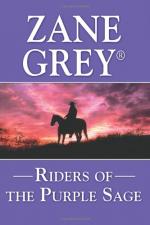With a deep-muttered curse Venters caught Wrangle through the sights and pulled the trigger. Plainly he heard the bullet thud. Wrangle uttered a horrible strangling sound. In swift death action he whirled, and with one last splendid leap he cleared the canyon rim. And he whirled downward with the little frog-like shape clinging to his neck!
There was a pause which seemed never ending, a shock, and an instant s silence.
Then up rolled a heavy crash, a long roar of sliding rocks dying away in distant echo, then silence unbroken.
Wrangle’s race was run.
CHAPTER XVIII. OLDRING’S KNELL
Some forty hours or more later Venters created a commotion in Cottonwoods by riding down the main street on Black Star and leading Bells and Night. He had come upon Bells grazing near the body of a dead rustler, the only incident of his quick ride into the village.
Nothing was farther from Venters’s mind than bravado. No thought came to him of the defiance and boldness of riding Jane Withersteen’s racers straight into the arch-plotter’s stronghold. He wanted men to see the famous Arabians; he wanted men to see them dirty and dusty, bearing all the signs of having been driven to their limit; he wanted men to see and to know that the thieves who had ridden them out into the sage had not ridden them back. Venters had come for that and for more—he wanted to meet Tull face to face; if not Tull, then Dyer; if not Dyer, then anyone in the secret of these master conspirators. Such was Venters’s passion. The meeting with the rustlers, the unprovoked attack upon him, the spilling of blood, the recognition of Jerry Card and the horses, the race, and that last plunge of mad Wrangle—all these things, fuel on fuel to the smoldering fire, had kindled and swelled and leaped into living flame. He could have shot Dyer in the midst of his religious services at the altar; he could have killed Tull in front of wives and babes.
He walked the three racers down the broad, green-bordered village road. He heard the murmur of running water from Amber Spring. Bitter waters for Jane Withersteen! Men and women stopped to gaze at him and the horses. All knew him; all knew the blacks and the bay. As well as if it had been spoken, Venters read in the faces of men the intelligence that Jane Withersteen’s Arabians had been known to have been stolen. Venters reined in and halted before Dyer’s residence. It was a low, long, stone structure resembling Withersteen House. The spacious front yard was green and luxuriant with grass and flowers; gravel walks led to the huge porch; a well-trimmed hedge of purple sage separated the yard from the church grounds; birds sang in the trees; water flowed musically along the walks; and there were glad, careless shouts of children. For Venters the beauty of this home, and the serenity and its apparent happiness, all turned red and black. For Venters a shade overspread the lawn, the flowers, the old vine-clad stone house. In the music of the singing birds, in the murmur of the running water, he heard an ominous sound. Quiet beauty—sweet music—innocent laughter! By what monstrous abortion of fate did these abide in the shadow of Dyer?




